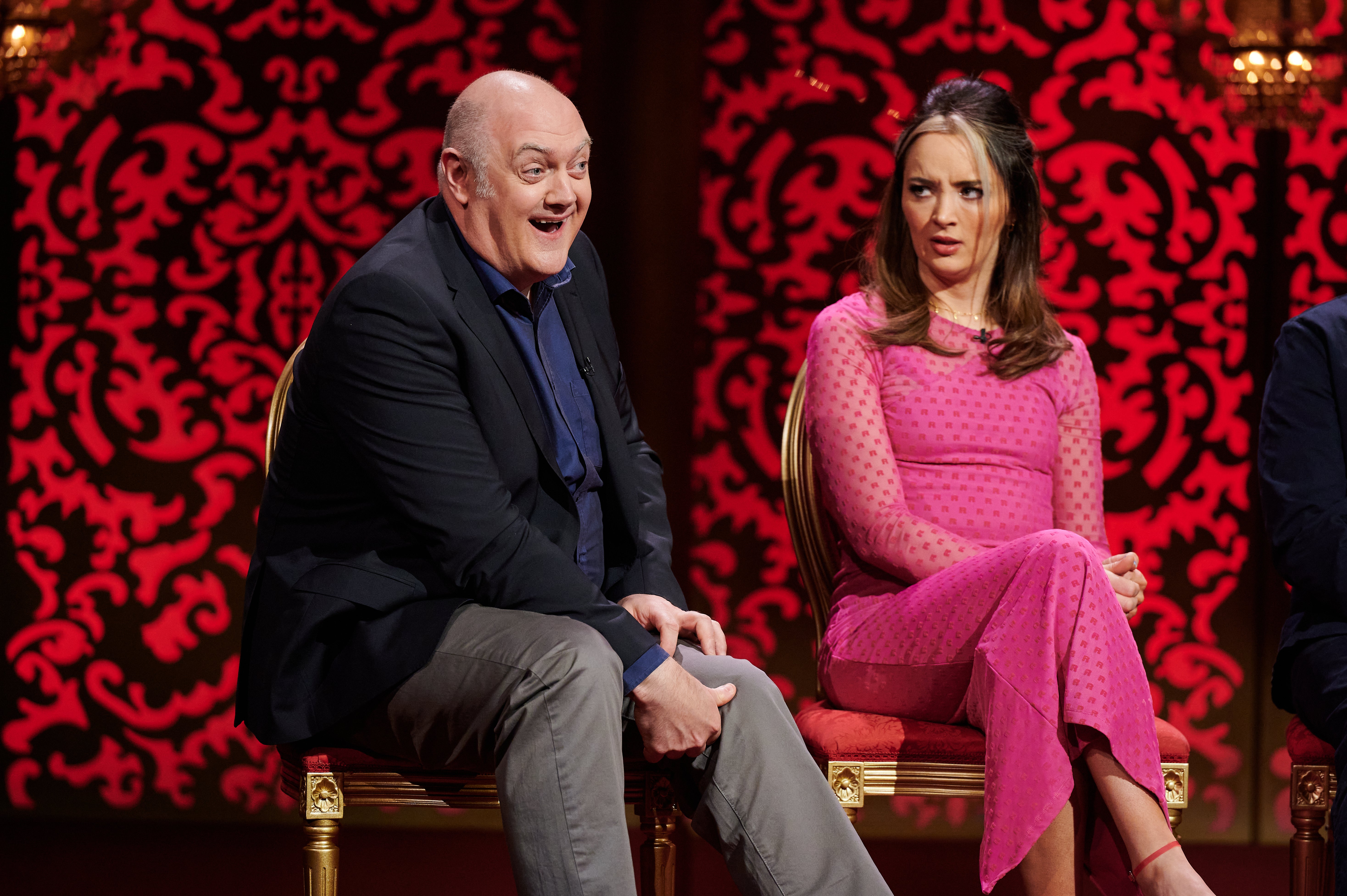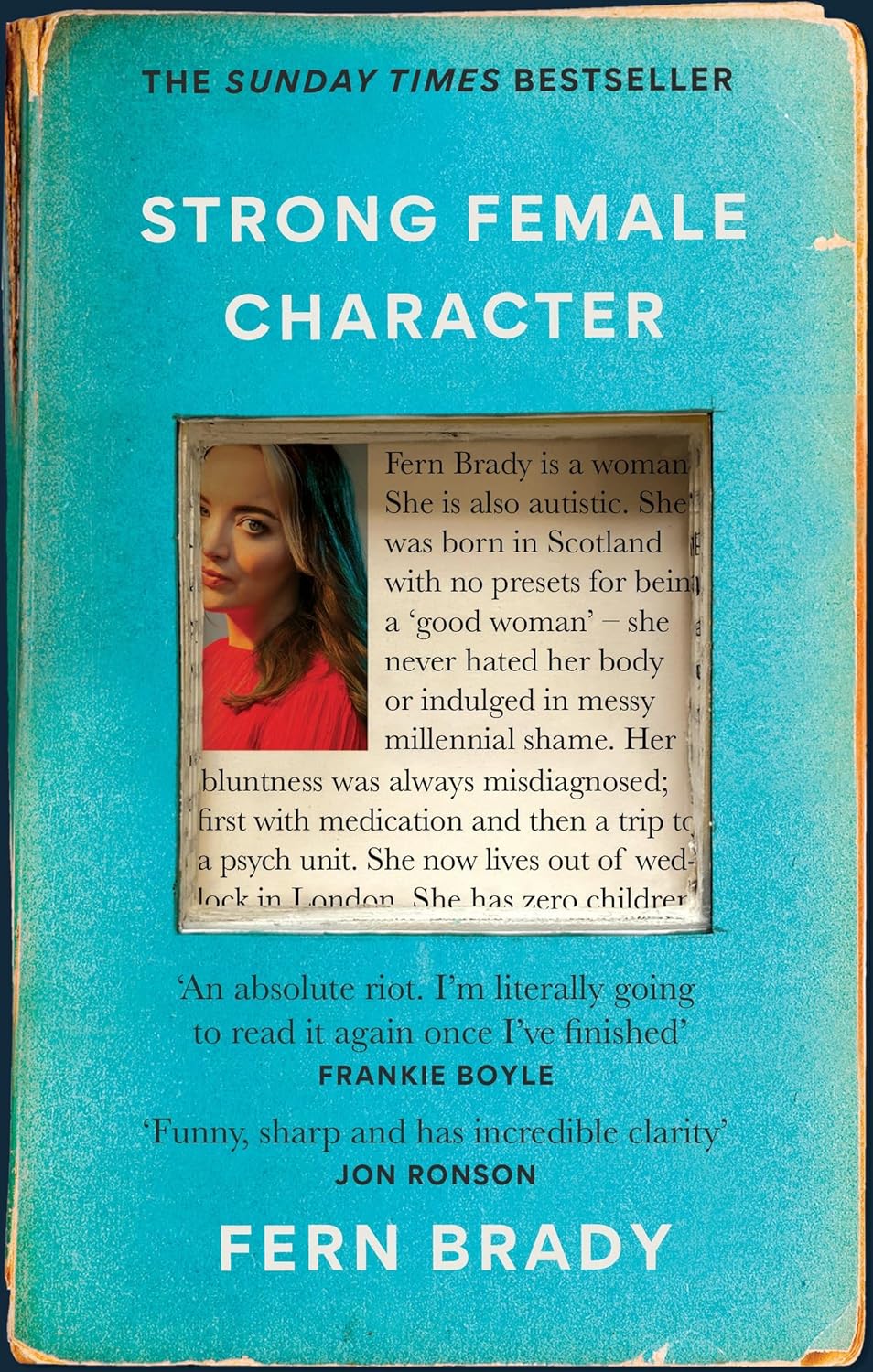Scottish stand-up Fern Brady: ‘Why are female comics always expected to speak out?’
The fierce, feminist star of ‘Taskmaster’ has been nominated for an award for her memoir about her late autism diagnosis. She tells Helen Brown about how others have responded to her book, predators in comedy, what TV execs thought of her stripping sitcom and why she’s happy for people to know she’s had Botox


Fern Brady was face down on a massage table last week when her masseuse started banging on about Russell Brand. “He was asking me if I think we’ve got rid of sexual predators on the circuit.” The comedian snorts in frustration. “I wasn’t there for one of your ‘luxury lady massages’, y’know. I was there because I have chronic back pain. I had to tell him: ‘You know what makes my shoulder tense right back up? TALKING ABOUT RUSSELL BRAND!’”
This is typical of Brady: the joy of the fiercely feminist Scot’s comedy lies in her snarling contempt for social absurdities and injustices. Little surprise, then, that she’s short of patience when it comes to conversations like these. She, along with fellow comedian Katherine Ryan, previously came under the spotlight for veiled comments about sexual predators in the comedy world. But she rolls her eyes at a culture that expects women to do the heavy lifting when it comes to calling out abusers, in an industry that’s long been skewed against them. “Why are FEMALE comics always expected to speak about this, do all the work?” she asks from her two-bed flat in south London. “Loads of us have just started to say: go and ask the male comedians about this. Go ask MEN what they’ve seen, what they can do…”
Brady has pulled no punches since she started her stand-up career in 2011, aged 25, coming third in Edinburgh Fringe’s annual So You Think You’re Funny competition (previous winners have included Peter Kay, Dylan Moran and Aisling Bea). From there she graduated to TV panel shows such as 8 Out of 10 Cats and, in 2022, joined the lineup for cult comedy show Taskmaster. She’s currently indulging her sillier side presenting podcast What A Combo (on which she tastes weird food combinations alongside fellow comedians) and her memoir about how her late diagnosed autism has often left her feeling at odds with the mainstream, Strong Female Character, has won glowing reviews and been shortlisted for the inaugural Nero Book Awards.
Out in paperback this month, Strong Female Character begins with her diagnosis in 2021, aged 34, and works backwards to make sense of her difference. She’s frank about the violent outbursts which she’s experienced during autistic overload – she once ended up in court for breaking a vodka bottle over another woman’s head. Given criticism from other autistic women on Twitter/X for “making it sound like we all smash up our houses”, today she’d like to clarify that meltdowns like hers are not experienced by all neurodivergent people.
People are intimidated by Greta Thunberg because of her autistic traits: because she doesn’t do the typical smiling
Born and raised in what she describes as the “nothing town” of Bathgate, West Lothian, Brady comes from a working-class Catholic family. Her dad’s a mechanic who graduated to management, her mum worked on the supermarket checkout; both were bewildered by their shy, clever daughter. A self-described “dorky kid in thick glasses”, she retreated from her peers into a series of “weird obsessions”; memorised every fact she could find about Sylvia Plath; taught herself Danish; learnt how to play every instrument in a brass band.
When I first interviewed Brady, back in 2019, she told me how these fixations gradually became subsumed by academic perfectionism. “At 16, I became obsessed with getting straight As, went mental and ended up in an adolescent psychiatric unit,” she said then. She was diagnosed with Obsessive Compulsive Disorder but sought a second opinion in textbooks and felt Asperger’s syndrome (now redefined as high functioning autism) was a better fit.
A psychiatrist told her she couldn’t be autistic because she was making eye contact and had a boyfriend, but those criteria were based entirely on Hans Asperger’s early 20th-century research into young autistic boys. Back then even medics didn’t understand that autistic people are capable of (often intense) empathy, creativity and humour. He didn’t realise that autistic girls “mask” their social difficulties better than boys – and as for having a boyfriend? Well, Brady snarks: “men are notoriously discerning about who they’ll have sex with, aren’t they”.
When it came to writing her book, Brady noticed other memoirs by late diagnosed women “were trying to explain, or justify, autism to neurotypical people. I know that’s important, but I felt I’d run out of patience with that. I didn’t want to do it. I wanted to write for other autistic people.” As a consequence, she believes that while her many neurotypical readers “enjoy the quality of the writing and the jokes or whatever… they still don’t get it.” But her autistic readers “send me multiple messages online every day. They come up to me at shows and readings, crying in my face because they feel I’ve written about their lives.”

Brady says that nice, middle-class audiences can be shocked to learn she funded her degree in Arabic at Edinburgh University by working as a stripper. In her book she’s blunt about feeling safer in strip clubs (where the social rules were clear and transgressors would be thrown into the street by bouncers) than in the many office jobs she took after graduation (where the boundaries and expectations were frighteningly murky). “In an office,” she says today, “even getting up from my desk and walking to the toilet makes me feel like I’m in a play. That sounds narcissistic, but in those spaces everything you do is being observed. I found working in an office with all women so difficult. It was the only time in my life where I binge drank. I hardly ever drink now because I don’t feel like I’m constantly suppressing myself.”
In the book, she writes that she “liked that in a strip club men’s contempt of you was out in the open,” In one club, she explains, the working women wore huge perspex heels which they stuffed with the bank notes they’d earned – the transactional nature of the situation exposed. She wouldn’t call it empowering – one of her bosses was a serial rapist; another stole from her – but she made good money and there was no fluorescent lighting to trigger sensory meltdowns.
Brady wrote a sitcom about strippers, but TV commissioners said her lived experience “wasn’t believable”. So she put all that material in the book instead, along with some powerful theorising about the possibility that autistic women have better sex. Because they’re less inclined to pretend they’re enjoying things they’re not, and more likely to be direct about their needs, Brady argues that “a significant number” of autistic women are able to embrace the kinks or queerness that their non-autistic peers suppress.
She writes that she grew up embracing her own bisexuality, only later in life being “made to be uncomfortable with it”. She lost her own virginity earlier (and she suspects more enjoyably) than her peers, on holiday, aged 15, to a 19-year-old Mexican waiter. When her horrified mother asked “Why?” she replied frankly: “He was really fit.”
I’ve never tried to rationalise getting Botox in a feminist way
After university, Brady started a career in journalism. But she was hooked on stand-up after writing a feature about it and made the finals of So You Think You’re Funny at the Edinburgh Fringe in 2011. After moving down to London she began making appearances on panel shows, where she “got really excited by all the free cakes before I realised that nobody was eating them. I remember offering some to another female celebrity as it hit me: ‘Of course you don’t want one. You’re on a juice diet. Only the cameramen are eating the doughnuts.’”
She laughs, heartily, at her own naivety. “It’s mental how, in the world of TV, nobody eats very much but nobody talks about dieting. When Lady Gaga said ‘pop stars don’t eat’, everyone got so mad at her. But I want to hear all about people fasting, all the mad stuff that they do because they are doing it!” Brady is more honest. She tweets about Botox appointments. “I’ve done stuff to my face,” she tells me. “I’ve never tried to rationalise getting Botox in a feminist way. I just think: ‘I’m a player in the game of showbiz, baby!’”

Like many members of the neurodivergent community, Brady enjoys speculating which celebrities are autistic or ADHD. “Although you’re not allowed to do that in public,” she laments. Pop star Sia was under heavy fire for her portrayal of a non-verbal autistic girl in her 2021 music while Brady was getting her diagnosis. That gave her “a taste of how, if some of the autism community don’t like what you’re doing, then they’re gonna go hard on it. That’s why I’m careful about what I say now, I’m always clear I don’t speak for all autistic people. But I KNEW Sia was autistic for years. I mean, she couldn’t have people looking at her! She always covered her face!” Sia revealed her own autism diagnosis in 2023.
“The idea that you’re not allowed to speculate on who’s autistic implies that it’s gross to be autistic,” argues Brady. “There are a lot of people I wanted to talk about in the book, female celebrities I’m 99 per cent sure are autistic. But as you’re not allowed to do that I put quotes from them through the book instead and autistic people who read it noticed and knew what I was doing.”
She relaxes more when discussing famous women, like environmental campaigner Greta Thunberg, whose diagnoses are on the public record. “It p***es me off when people try to use her autism as a reason to ignore her, as a slur. People are intimidated by her because of her autistic traits: because she doesn’t do the typical smiling. She doesn’t try to make people comfortable with facial expressions and soothing tones the way most women are conditioned to do.”
The nature of power and money makes change really hard... Audiences also find it hard to accept people they find funny might be awful
Similarly, Brady is upset that people “still often think I’m being unfriendly when all that happens is that I’ve forgotten to make the right face”. This meant Brady struggled to make female friends in her teens and twenties. “For years I always had male friends because that meant I didn’t need to pick up on all the complicated cues,” she says. “I had male friends who I always lost when they got girlfriends. I had years of that happening over and over again. Then I realised they weren’t properly my friends. Not in the way I thought. I’ve got a lot more weird female friends now, from comedy. That’s much better. But I still forget to text people… I find I’m thinking really warmly of somebody but a whole year has gone by and I’m too absorbed in work to send a message.”
Although she was “happier than I’ve ever been” throwing herself into the quirky challenges of Taskmaster in 2022, she still struggles with TV sets. “I hate the lighting, so I take breaks to get some daylight into my eyes. And I really hate people lightly stroking me. I did a really lovely TV job recently where the nice people on set did that all day. Not being creepy. It’s just a way I see non-autistic people showing affection, bonding… but it can leave my skin burning for hours afterwards. But I can’t imagine explaining that in a workplace. You don’t want to be difficult, you don’t want people to think you’re being a diva.”
That said, a recent tour of the US left her shocked by how “up themselves American comics are”. She also found it “really dispiriting” to hear many of her American peers defending Louis CK (in 2017, CK admitted that allegations of sexual misconduct made by five women were true). “I mean, oh my god! He w***ed in front of women and then sent his agent after them to threaten them when they started to speak out about it! People are still trying to play that down. Can you imagine what would happen if I masturbated in front of my support act? People would think I was mentally ill! I mean, just imagine turning those gender tables? Insane!”
Is it ever going to change? “The nature of power and money makes change really hard,” she shrugs. “Audiences also find it hard to accept people they find funny might be awful.” Brady can relate. She admits that before she’d heard the assault allegations against Russell Brand she “loved him when he was on Big Brother. I thought his podcast was really funny, soooo exciting. So I can understand why people have that cognitive dissonance.”
Now back in the UK, Brady is gearing up for a new tour called I Gave You Milk To Drink. It’s a quote from Corinthians, which continues “not solid food; for you were not yet able to consume it”. She tells me it’s a joke about how, if people thought she was brutal before, she’s now preparing to deliver “the purest, most truthful version of stand-up.” She adds that “actually I am always holding back, because stand-up is a compromise between the comic and the audience. In my last show I said that, although I really love my boyfriend, I think marriage is really dumb. I really can’t wrap my head around it. But loads of people in my audience will have had a really traditional wedding or want one so I can’t slag it too much… I’m even worrying now in case you had a really lovely wedding. Did you?” (I assure her I’m not married.)

Brady might go for a civil partnership instead, because she likes the idea of “a good party where people could dance”. But, although she sniggers about the tour poster “with me squirting milk out of my boob”, motherhood is not on her agenda. Even so, people – including her builder – ask her constantly why she doesn’t want kids. “I’ve started saying ‘because I don’t want a busted old fanny’ because I like how quiet the taxi drivers go after that one,” she Tweeted last November.
“My life just got so good,” she tells me, “why do people think I’d want to ruin it now?!” Alert to the social conditions as ever, she corrects herself. “Actually, if I were a man I’d probably have children. Or maybe even as a woman in Iceland. They have a much better deal with childcare out there, don’t they?”
Anyway, Brady is far too besotted with her new kitchen to see it splattered with baby puree. “I laugh at these people getting married, and then I think of myself obsessing over taps and tiles,” she laughs. “I’ve read that creating the perfect kitchen is just another kind of performative femininity,” she frets briefly. “But I like to cook!”
‘Strong Female Character’ is out now, published by Brazen. Winners of the Nero Book Awards are announced on 30 January
Join our commenting forum
Join thought-provoking conversations, follow other Independent readers and see their replies
Comments
Bookmark popover
Removed from bookmarks